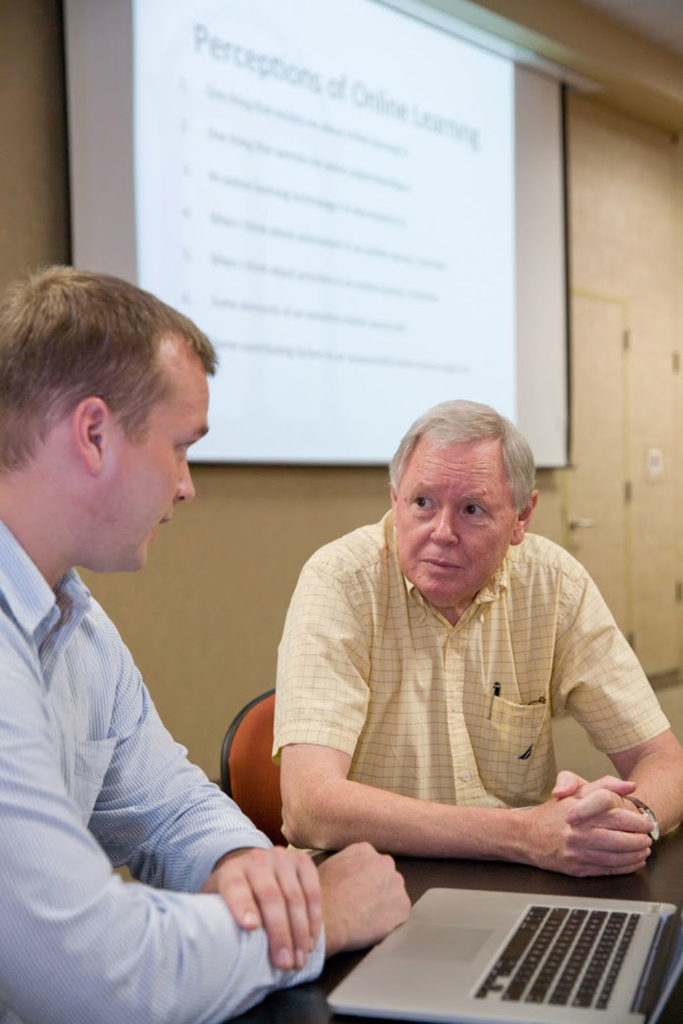Athens, Ga. – The University of Georgia has dramatically expanded its online course offerings and degree programs, providing students the flexibility to complete their degree requirements more quickly and expanding access to undergraduate and graduate programs for working adults.
“Online education enables students to make progress toward their degrees while pursuing internships, studying abroad or spending time at home with family over the summer,” said Pamela Whitten, senior vice president for academic affairs and provost. “It also expands the reach of our programs to make them available to people who want a UGA education but can’t relocate because of their careers or family obligations.”
The number of students enrolled in summer online courses has increased dramatically in the past year alone, and more online learning opportunities are in the pipeline as the university’s Office of Online Learning approaches its second anniversary.
Vice President for Instruction Laura Jolly noted that 1,900 students enrolled in summer online classes in 2013. This year, that number increased by 32 percent to more than 2,500, and more students are still expected to enroll. Jolly attributed much of this rapid growth to the Online Learning Fellows program, which was launched in 2013 to provide faculty with the training and support to design, develop and teach high-quality online courses. Online Learning Fellows receive support to develop a three credit hour course, and the program has resulted in 56 new summer e-courses.
“Students are embracing our summer online courses, which are a key element of our Complete College Georgia plan to decrease the time it takes them to earn their degrees,” Jolly said.
Data from the UGA Office of Institutional Research suggest that students who take summer courses tend to be among the university’s most ambitious. They are more likely to graduate within four years, and those who come to UGA with credit hours earned through Advanced Placement courses often use summer courses to graduate in three years.
Keith Bailey, who directs the Office of Online Learning, said the new summer online courses only hint at the potential for online education at UGA. Future cohorts of the Online Learning Fellows program will explore instructional strategies for scaling courses to reach an even greater number of students. Another focus of the Online Learning Fellows program will be redeveloping courses by exclusively utilizing free, open-educational resources, which has the potential to significantly reduce the cost of instruction for students.
In addition, select faculty will work with the Office of Online Learning to transition courses to blended formats that enable more efficient use of classroom time. Students in lab or studio-based courses, for example, could view lectures or demonstration videos online so that more classroom time can be used for active learning. “Such an approach can free up faculty time to increase opportunities for active engagement with students,” Bailey said.
Increasing access to UGA
In fall 2014, the university will increase the number of online graduate programs it offers by more than a third with the launch of seven new online programs. New online degree programs include a master’s of Internet technology degree through the Terry College of Business, a master’s in food technology through the College of Agricultural and Environmental Sciences and several graduate programs through the College of Education, including Teaching of English as a Second Language. The university also offers 11 online graduate programs in areas such as adult education; pharmaceutical and biomedical regulatory affairs; instructional technology; and reading education.
UGA offers an online Bachelor of Science degree-completion program in special education and in 2015 will launch a two-year degree-completion Bachelor of Business Administration program. Both are targeted to working professionals who have earned previous college credits and seek to advance in their careers.
For Maria Navarro, an associate professor of agricultural leadership, education and communication in the College of Agricultural and Environmental Sciences, the decision to develop an online course stemmed from her desire to increase access to her course “Reflections on Fighting Hunger.”
“I had students who had internship opportunities around the world and had indicated they would love to take my course while they were on their internship,” said Navarro, a 2014 recipient of the university’s Russell Award for teaching excellence. “Teaching the course at a distance seemed to be the best way to serve students on internships and also expand the vicarious experiences of all the other participants.”
For more information on online education at UGA, see http://online.uga.edu/.
